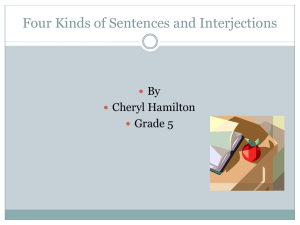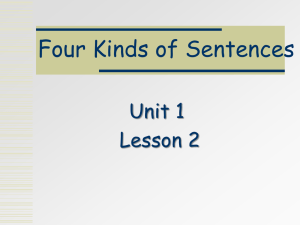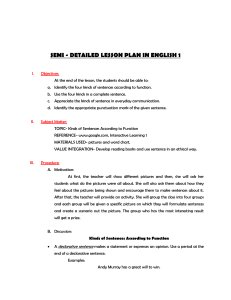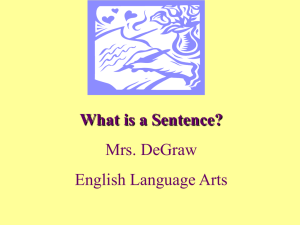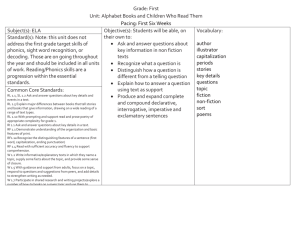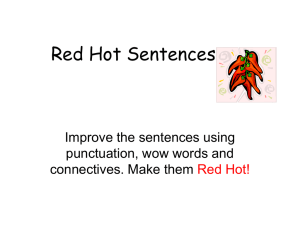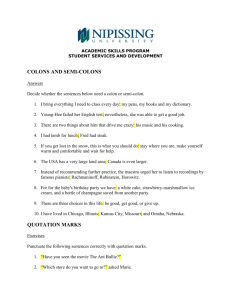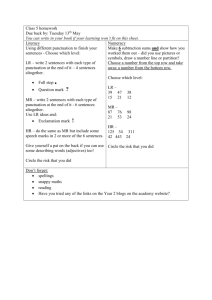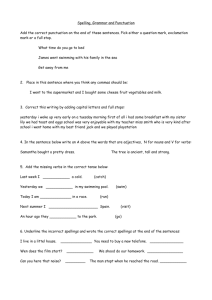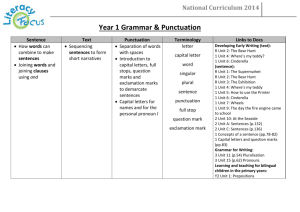LONGWOOD LESSON PLAN-Language Arts
advertisement
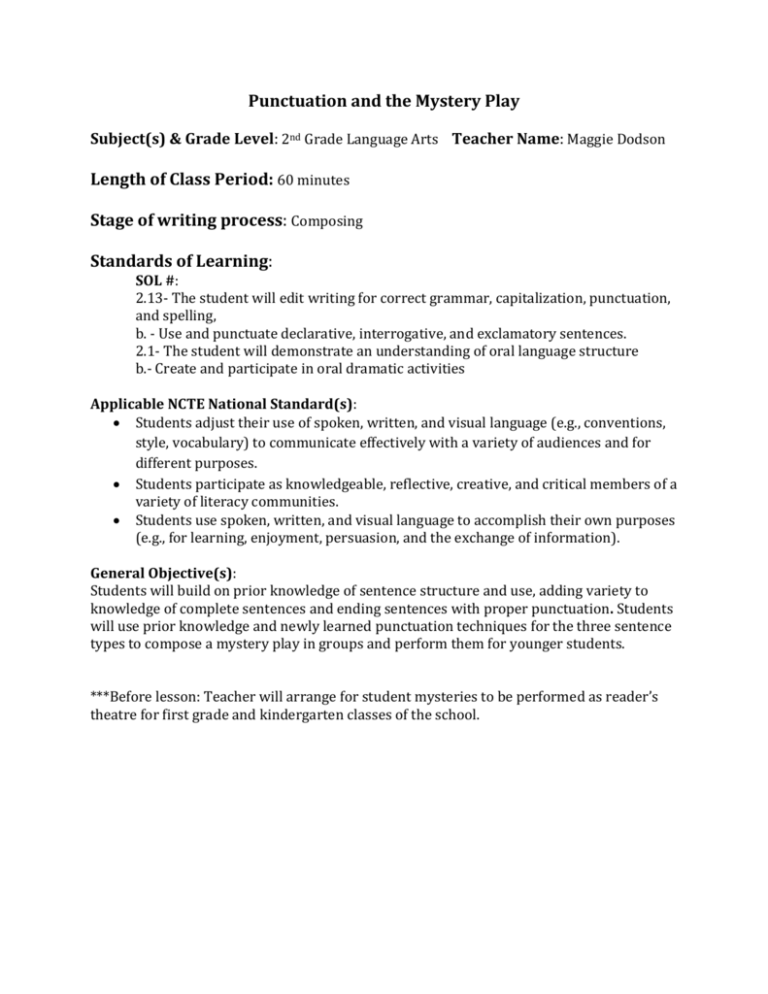
Punctuation and the Mystery Play Subject(s) & Grade Level: 2nd Grade Language Arts Teacher Name: Maggie Dodson Length of Class Period: 60 minutes Stage of writing process: Composing Standards of Learning: SOL #: 2.13- The student will edit writing for correct grammar, capitalization, punctuation, and spelling, b. - Use and punctuate declarative, interrogative, and exclamatory sentences. 2.1- The student will demonstrate an understanding of oral language structure b.- Create and participate in oral dramatic activities Applicable NCTE National Standard(s): Students adjust their use of spoken, written, and visual language (e.g., conventions, style, vocabulary) to communicate effectively with a variety of audiences and for different purposes. Students participate as knowledgeable, reflective, creative, and critical members of a variety of literacy communities. Students use spoken, written, and visual language to accomplish their own purposes (e.g., for learning, enjoyment, persuasion, and the exchange of information). General Objective(s): Students will build on prior knowledge of sentence structure and use, adding variety to knowledge of complete sentences and ending sentences with proper punctuation. Students will use prior knowledge and newly learned punctuation techniques for the three sentence types to compose a mystery play in groups and perform them for younger students. ***Before lesson: Teacher will arrange for student mysteries to be performed as reader’s theatre for first grade and kindergarten classes of the school. Specific Learning Objectives The student will be able… Instructional Procedures The teacher will… Introduction: Intro and Questions (6 minutes) 1) Sit together, facing the teacher and board 3) Identify and share their knowledge of questions 4) Apply new knowledge by asking each other questions 5) Ask the teacher a question and recognize why types of sentence other than questions are necessary Intro and Questions (6 minutes) 1) Start by asking the students questions, but in a naturally flowing way. As if you would any other conversation. However, ONLY use questions. For example 2) “How has your day been? How was lunch? Are you excited to be here? What do you think we’re going to talk about today? “ 3) Conversate with students for 2-3 minutes. Then ask students if they notice anything different about the way you are speaking today. A student may have picked up on you only asking questions and share. If not, simply guide them to the answer. 4) Once there, ask what kind of punctuation would be used at the end of a question. Once students arrive at a question mark, write one on the board with the words “question” and interrogative under it. While writing, have the students ask each other questions. 5) Ask a student to ask you a question (*optional: about something being studied in another part of class). Answer the student with a question, then explain why that was unhelpful. For example: Teacher: Will one of you ask me a question about punctuation? Student: Do you need a period and a question mark for the sentence? Teacher: Did you only ask that because I told you too? (Student may respond.) Did that answer his question? No? Then there must be another kind of sentence that sates something. What could that be? Statements (5 minutes) 1) Students may have learned about statement (declarative) sentences and may know the answer. If not guide them to it as before. Statements (5 minutes) 1) Identify and share any preexisting knowledge of statements 2) Apply new knowledge by making statements Exclamations (5 minutes) 1) Identify and share any preexisting knowledge of exclamatory sentences 2) Apply new knowledge by exclaiming things to each ohter. 2) Ask what king of punctuation would be used for this kind of sentence. Once students arrive at period, write one on the board with the words “statement” and declarative written underneath. Exclamations (5 minutes) 1) Ask students if statements would be appropriate if they were really excited/happy or even upset. Perhaps give a scenario, such as getting a present or making a new friend. Ask students if they were writing about this, would a period be enough to express much they were feeling? 2) Once they arrive at no, introduce the exclamation mark, and write it on the board with the period and question mark, with exclamatory under it. 3) Explain how using these different types of sentences can improve writing and help guide the reader to know what we mean, transition into group activity. *** Allow students to interact mainly while writing on board for only a minute or two. Main Lesson: Activity Time Procedure (Remainder of class time) Activity Time Procedure (Remainder of class time) Desks should already be in groups of 3-5, with students knowing where they are supposed to sit. 1) Explain the assignment to students if it has not been done; if you choose to use a structured handout, pass it out now. Assignment: Write a play using the three sentence types. There should be one character for each student, but all students should help writing the play in its entirety, not just their own lines. (The play should be around 10-15 lines.) The catch: Characters can only use one type of sentence. For instance, if the play had a mom, dad and child, the mother could only ask questions, the father only declare things, or make statements, and the child could only use exclamatory sentences. In groups with more than three people, some students’ characters will have the same sentence type. Have each character has to speak at least twice to be sure all sentence types are understood and utilized. Each student should write a copy of the script and once done, highlight their own lines for use during performance. Only one script with all the names on it needs to be turned in. Students could be free to choose the genre of the play, or it could be a required mystery, “The Case of the Missing_______.” Teachers could choose to have students write the plays about another area of current study, such as history. 2/3) Walk around, offering ideas and support and keep students on task 2) Collaborate with group to brainstorm their plays and use of punctuation. (10 minutes) 3) Compose a play using the punctuation learned. (20-30 minutes) 4) Give students a notice that time is almost up 5) Have each group perform their play! *** (20 minutes give or take, depending on number of groups) *** If there is not time that day to perform plays, going over lines can be part of homework and plays can be performed the next day. Closure: Compare punctuation, identifying the uses of and differences between three sentences Discuss sentence types and punctuation uses with students Perform their mystery plays! Extension/assignment: Write a short prequel or sequel to your group’s play, using at least one example of each type of sentence. This should be in the style of a story. For instance, if the play was the case of the missing pie, a student may write a story about how delicious the pie was after they found it and ate it, or about how the pie got lost in the first place. Possibly go over lines of play, depending on performance date. Accommodations/provisions for individual differences: Can be made based on individual class dynamic and needs Formative/summative evaluation: Class time/ Play evaluation: Students will be graded on the following: Were students able to use each sentence during mini-lesson student discussions? Did each character only use one type of sentence? Were the sentences punctuated properly on the script? Were they used effectively? o Make sense o Flow well within the play Students will also receive a participation grade for cooperation during their performance Homework Evaluation: Students will be graded on the following: Was each sentence type used? Were they punctuated properly? Were they used effectively? Self- and/or peer evaluation: Students will complete a short group evaluation sheet rating group members on how well they participated and if they contributed to the group’s work. Products students will create: Mystery Plays Texts students will read: n/a Materials/resources: TeacherWhite board or similar Prepared short play example (See below) Desks pre-arranged in groups of 3-5 (More is possible, but not ideal without modification) ***Optional structured handout StudentsPencils Paper Sources for ideas/materials in APA format: n/a Rationale: This lesson plan focuses on the composing aspect of the writing structure. Though students may wish to spend some initial time brainstorming, composing will take the most time and be the most crucial part of this activity. This lesson incorporates the theater day with Rhonda Scarrow- students both write and perform plays. Proper punctuation of sentences will follow students through life, and an early exposure to multiple kinds of writing and the differences in formats (such as play writing ) is beneficial to students, giving them an understanding of and a preparation for these formats in the future. Giving students the choice of what to write their plays on gives a level of freedom and excitement for students. Also, performing the plays for younger grades gives the students a real, authentic audience. Short play example: Sally: Is there going to be pie for dessert? (interrogative) Grandma: It’s still baking. (declarative) Sally: When will it be done? (interrogative) Billy: Something smells like it’s burning! (exclamatory) Sally: Is that the pie? (interrogative) Grandma: It’s not supposed to be done until 6:00. (declarative) Billy: It’s 6:30! We have it get it out of the oven! (exclamatory) Handout: “The Case of the Missing ___________________________” Names:_____________________________________________________________________________ Characters:__________________________________________________________________________ Character/Actor name Lines Character/Actor name Lines
